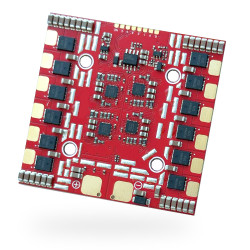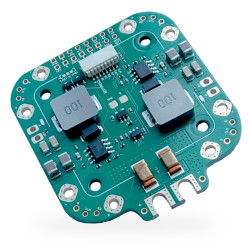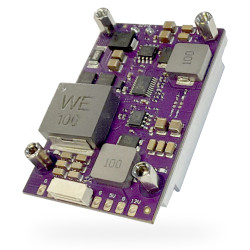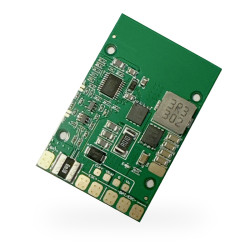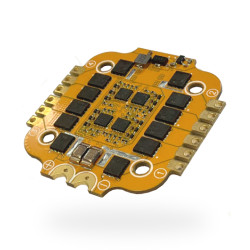Model: Flytex ESC 80A 8S
2 400.00 грн.
Esc 80a 8s 4-in-1 on AM32 firmware | Powerful speed regulator for FPV and industrial drones
High-performance 4-in-1 ESC 80A 8s on AM32 firmware is ..
Model: Flytex FCHUB-12s
748.00 грн.
Flytex FCHUB12S — High-current PDB for large drones and X-Class platformsFlytex FCHUB12S is a powerful power distribution board designed for heavyweig..
Model: Flytex PDB12S
1 800.00 грн.
PDB 12S power distribution module for wing-type UAVs, 140A / 12S / 3xBEC, alternative to Matek PM12S-3
The PDB 12S module is a reliable power distrib..
Model: Flytex PDB 8S
600.00 грн.
PDB with 8V-36V (3S-8S) wide input voltage range and TVS protection is a powerful power distribution board designed for wing-type drones and high-powe..
Model: Fuzia ESC 65A 6S
1 400.00 грн.
ESC 6S 65A – Powerful speed controller for FPV drones
The ESC 6S 65A is a reliable and powerful electronic speed controller designed for FPV drones t..
An Electronic Speed Controller (ESC) is a purpose-built device designed for controlling the speed of an electric motor. Using a specialised combination of hardware and firmware, ESCs drive motors to a commanded speed. They maintain motor speed under various circumstances, such as the dynamic load of a propeller.
The ESC (Electronic Speed Controller) is a key component of FPV (First Person View) drones, which is responsible for controlling the rotation speed of the motors. It receives signals from the flight controller and regulates the power supplied to the engines, providing stability and control during flight.
Main functions of ESC for FPV:
1. Motor speed control – ESC controls the rotation of each motor, allowing the drone to quickly change direction, altitude or speed.
2. Overheat Protection – Modern speed controllers have built-in protection mechanisms to prevent components from overheating or overloading.
3. Braking (Active Braking) - this function allows the motor to quickly stop or change direction, which is especially important for FPV flights, where high maneuverability is required.
4. Compatibility with different types of motors – ESCs can work with different types of brushless motors, making them versatile for different models of drones.
5. Telemetry – Some ESC models can transmit engine and battery status data to the control panel, allowing the pilot to monitor real-time readings.
Advantages of using ESC in FPV drones:
1. High control accuracy.
2. Improved stability during flight.
3. Optimization of energy consumption to extend the duration of the flight.
The ESC (Electronic Speed Controller) is a key component of FPV (First Person View) drones, which is responsible for controlling the rotation speed of the motors. It receives signals from the flight controller and regulates the power supplied to the engines, providing stability and control during flight.
Main functions of ESC for FPV:
1. Motor speed control – ESC controls the rotation of each motor, allowing the drone to quickly change direction, altitude or speed.
2. Overheat Protection – Modern speed controllers have built-in protection mechanisms to prevent components from overheating or overloading.
3. Braking (Active Braking) - this function allows the motor to quickly stop or change direction, which is especially important for FPV flights, where high maneuverability is required.
4. Compatibility with different types of motors – ESCs can work with different types of brushless motors, making them versatile for different models of drones.
5. Telemetry – Some ESC models can transmit engine and battery status data to the control panel, allowing the pilot to monitor real-time readings.
Advantages of using ESC in FPV drones:
1. High control accuracy.
2. Improved stability during flight.
3. Optimization of energy consumption to extend the duration of the flight.

